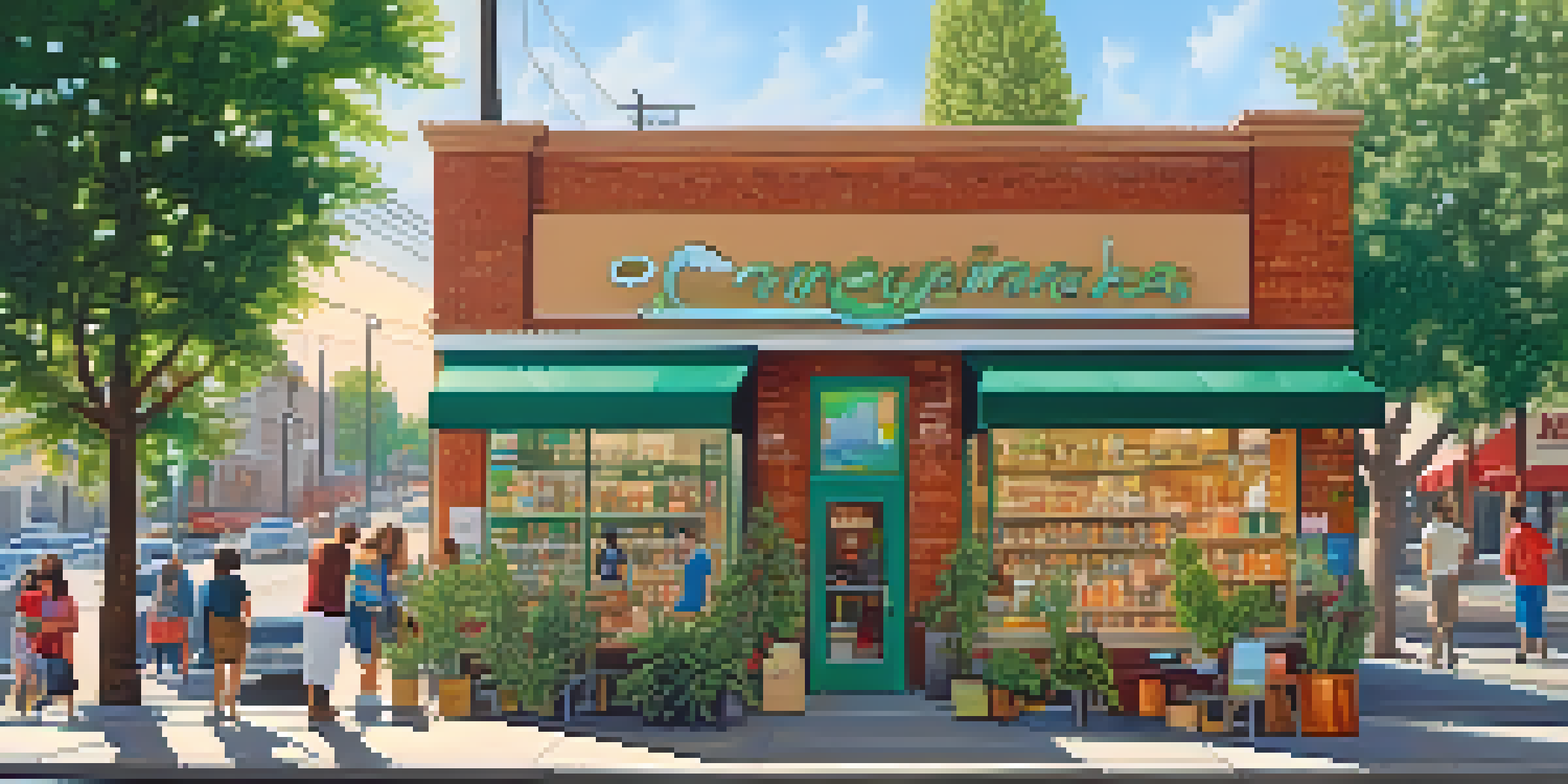Marijuana Dispensaries: Impacts on Local Real Estate Markets

Understanding the Rise of Marijuana Dispensaries
In recent years, the legalization of marijuana has led to a surge in dispensaries across various states. This change reflects a shift in public perception and regulatory frameworks, allowing businesses to emerge in a previously restricted market. As more states adopt pro-cannabis legislation, the landscape of local economies is evolving, creating new opportunities and challenges.
Marijuana is a gateway drug to the economy.
Marijuana dispensaries often bring a unique blend of clientele, contributing to the vibrancy of local neighborhoods. They tend to attract a diverse group of customers, which can enhance foot traffic and support surrounding businesses. This increased activity can make an area more appealing to potential homebuyers and investors alike.
However, the presence of dispensaries can also stir debate among community members about safety, zoning, and property values. Understanding these dynamics is essential for grasping their impact on local real estate markets.
Effects on Property Values Near Dispensaries
Studies indicate that the proximity of marijuana dispensaries can have varied effects on property values. In some cases, homes located near dispensaries have seen an increase in value due to heightened demand for convenience and the revitalization of nearby areas. This uptick can be attributed to the overall desirability of living close to businesses that draw in consistent foot traffic.

Conversely, some neighborhoods experience a decline in property values when dispensaries open nearby. Concerns about crime rates, noise, and traffic can deter potential buyers, leading to a drop in demand. This dichotomy highlights the importance of considering local sentiment and regulations when assessing the impact of dispensaries on real estate.
Dispensaries Boost Local Economies
Marijuana dispensaries attract diverse clientele, enhancing foot traffic and benefiting surrounding businesses.
Ultimately, the relationship between dispensary proximity and property values can vary widely based on community context, making it essential for buyers and investors to conduct thorough research.
Zoning Laws and Dispensary Locations
Zoning laws play a pivotal role in determining where marijuana dispensaries can operate. These regulations can restrict dispensaries to specific areas, often away from residential neighborhoods, which can influence local real estate development. Understanding zoning ordinances is crucial for both dispensary owners and potential homebuyers, as these rules directly impact property desirability.
The legalization of marijuana is not just about cannabis; it's about the economy, social justice, and the community.
In some regions, municipalities have embraced dispensaries by designating zones that welcome them, promoting economic growth and attracting new residents. This proactive approach can lead to improved local infrastructure and increased property values. However, in areas where zoning laws are restrictive, the potential for real estate development may be stunted.
As the legal landscape surrounding marijuana continues to evolve, so too will the implications for zoning laws and their impact on local real estate markets.
Commercial Real Estate Opportunities
The rise of marijuana dispensaries has opened new doors for commercial real estate investors. Properties that are well-suited for dispensary operations, such as retail spaces, are becoming increasingly sought after. This trend can lead to a spike in commercial property values and attract more businesses to the area, creating a ripple effect in the local economy.
Investors are also recognizing the potential for developing mixed-use properties that combine residential and commercial spaces. Such developments can provide a convenient living arrangement for residents while fostering a community atmosphere centered around dispensaries and other local businesses. This synergy can be a winning formula for driving both residential and commercial real estate growth.
Zoning Laws Shape Dispensary Success
Zoning regulations significantly influence where dispensaries can operate, impacting local real estate development.
As more entrepreneurs explore the cannabis sector, the commercial real estate market is likely to see continued innovation and diversification.
Community Perception and Its Influence
Community perception can significantly influence the success of marijuana dispensaries and their impact on real estate. Positive sentiments toward dispensaries can drive up property values and enhance local business prospects, while negative perceptions can lead to resistance and diminished demand. Engaging with community members and addressing concerns can foster a more favorable environment for dispensaries to thrive.
Community outreach initiatives, such as educational events and partnerships with local organizations, can help dispel myths surrounding cannabis use and its effects. By building trust and demonstrating their commitment to the community, dispensaries can mitigate concerns and create a more harmonious relationship with residents. This positive engagement can ultimately influence the real estate market favorably.
Thus, understanding the community's viewpoint is crucial for both dispensary operators and real estate stakeholders looking to navigate this evolving landscape.
Impact on Local Business Ecosystems
The establishment of marijuana dispensaries can invigorate local business ecosystems by attracting new customers and generating increased foot traffic. Local shops, restaurants, and services often benefit from the influx of visitors drawn to dispensaries, fostering a sense of community and economic growth. This can lead to a more vibrant neighborhood, ultimately making the area more appealing to potential homebuyers.
Moreover, dispensaries frequently collaborate with other local businesses, creating mutually beneficial partnerships. For example, they may promote local artisans or feature local products, enhancing the sense of community and supporting the local economy. Such collaborations can elevate the overall attractiveness of the area, influencing real estate dynamics positively.
Community Perception Affects Value
Positive community sentiment towards dispensaries can elevate property values, while negative perceptions may have the opposite effect.
These interconnected relationships illustrate how marijuana dispensaries can act as catalysts for broader economic development within their communities.
Future Trends in Real Estate and Dispensaries
As marijuana legalization continues to spread, the relationship between dispensaries and real estate markets is likely to evolve. Future trends may include a growing acceptance of dispensaries in traditionally residential areas, leading to shifts in zoning regulations and property values. This evolution will require stakeholders to remain agile and informed about changing laws and community sentiments.
Additionally, the development of new technologies and business models within the cannabis sector could influence real estate dynamics. For example, online sales and delivery services may reduce the need for physical storefronts, altering the demand for commercial spaces. This could lead to a reconfiguration of local real estate strategies.

In this ever-changing landscape, staying ahead of trends will be essential for investors, business owners, and community members alike.